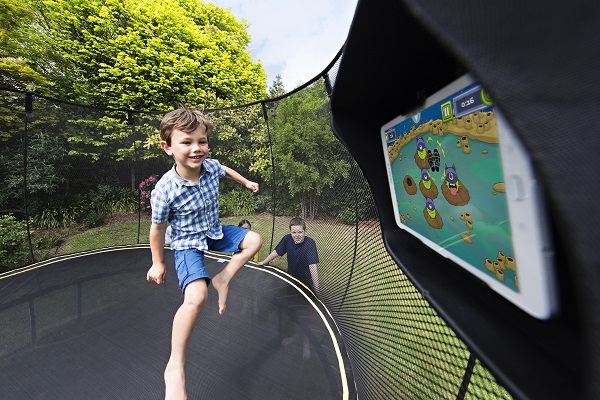
The Springfree Tgoma
The patented fitness technology, developed with physiologists from Canterbury University utilises a unique signal processing algorithm to enable a trampoline user to emulate the ‘swipe’ movements on a tablet in a series of specially designed gaming apps.
The system uses mat sensors to detect trampoline jump location, jump height, and even calorie-burn rate, and converts it using a patented algorithm to enable the jumper to play games using their entire body as the controller.
Created by Christchurch-based Springfree Trampoline, the innovative new device was designed to encourage more active play for Kiwi kids.
International studies show that some kids are spending more than 60 hours per week consuming media, and fewer than 60 minutes playing outside.
The tgoma – an acronym for ‘take gaming outside & make it active’ – was created to re-direct children’s passion for digital technology and make it a physical activity.
Jonathan Collins, tgoma product manager says the device leverages technology to shift screen time from being a sedentary activity to being an active experience, with significant wellness benefits.
“The gamification of fitness is a rapidly growing trend globally, essentially it is bringing together elements of the digital gaming industry and augmenting traditional fitness activities. The aim is to find new ways to engage the mind as well as the body during exercise,” says Collins.
Dr. Carl Petersen, from Canterbury University says the technology underlying tgoma is new and involved extensive research and testing.
Dr Peterson says from there the device was calibrated with university students paid to jump over 1.2 million times.
Professor Barry Taylor, from Otago University, says obesity continues to be an issue for New Zealanders with the condition likely to overtake tobacco as the leading preventable risk to health in New Zealand within the next 12 months.
More than 30 percent of New Zealand children aged two to 14 are either obese or overweight. Increasing inactivity from sedentary device use is a contributing lifestyle factor, he says.
“With significantly increasing child obesity rates a national problem, a great deal of research is now going into focusing on prevention and management of this issue,” says Professor Taylor.
Collins says while many exergames are used indoors, the Springfree tgoma was designed to take gaming outside where it can be a fully active, whole-body, fresh-air experience for kids.
“We wanted to create something which could deliver health benefits from cardiovascular fitness to musculoskeletal strengthening in a fun and compelling way which merges exercise with play.
Collins says the tgoma gaming ecosystem is also designed to encourage Kiwi app designers to add their creations and earn revenue.
“Springfree featuring tgoma integrates with the user’s own digital tablet and includes educational games and fitness tracking features. Players can participate in worldwide competitions and compare their high scores with friends, family and participants all over the world,” he says.
Educators and politicians are trying to address the current teaching shortage through different policy settings.…
Melanie Webber was the president of the secondary school union PPTA Te Wehengarua from 2021…
Wait times for paediatric care is having an impact on young people’s education and the…
Home of the brave, land of the free… except when it comes to books for…
Could a gender achievement gap in maths be due to confidence? Sarah Buckley from the…
The much-delayed English draft curriculum is now out for consultation, generating discussion from teachers.
This website uses cookies.